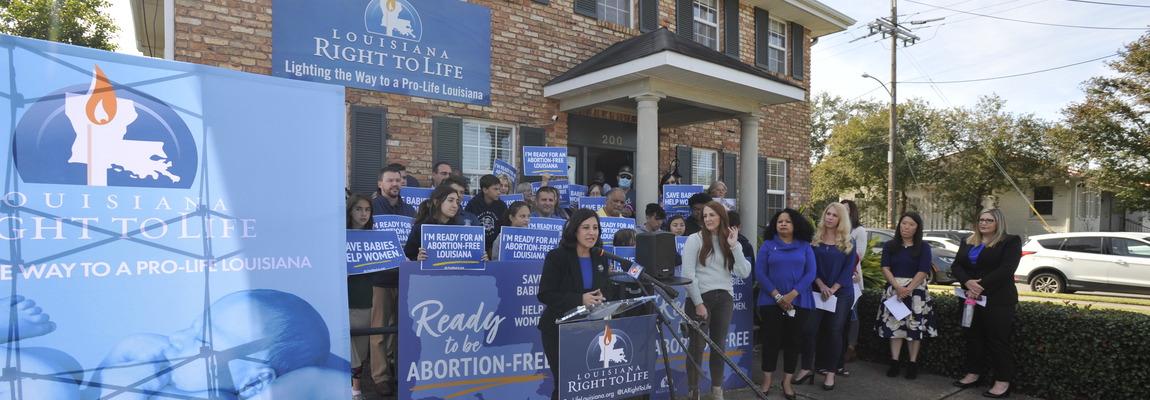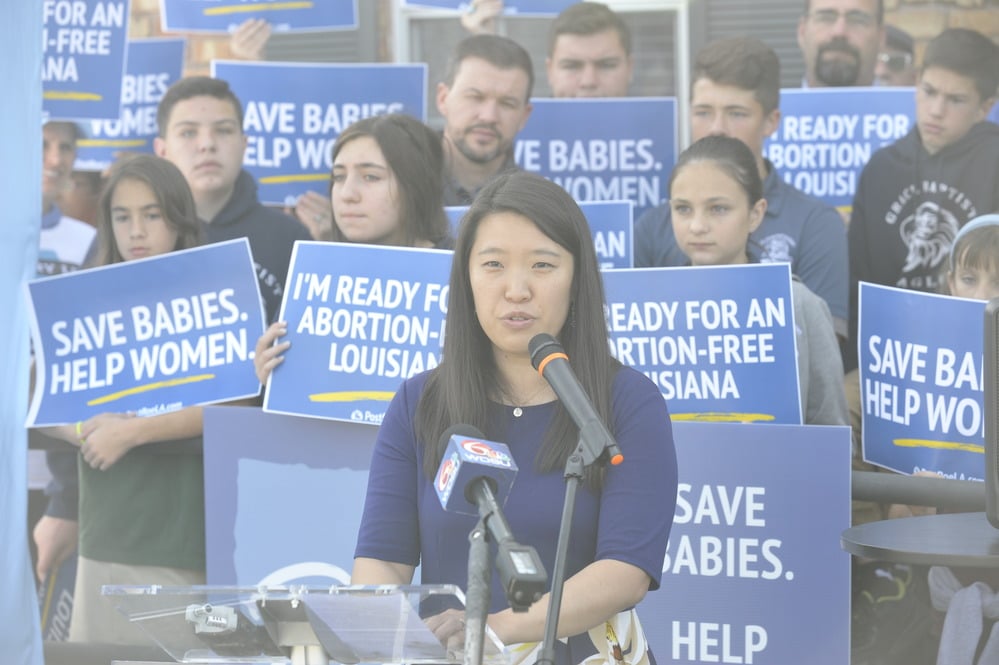
A platform that encourages healthy conversation, spiritual support, growth and fellowship

NOLACatholic Parenting Podcast
A natural progression of our weekly column in the Clarion Herald and blog

The best in Catholic news and inspiration - wherever you are!
Pro-life community heartened by oral arguments in Mississippi abortion case
-
By Peter Finney Jr.
Clarion HeraldWhile no one can predict the outcome of a Supreme Court case on the basis of oral arguments, Louisiana Right to Life associate director Angie Thomas said Wednesday she was heartened that at least six of the nine justices asked questions that seemed to support Mississippi’s ban on abortion after 15 weeks of pregnancy.
In a press conference outside the pro-life organization’s New Orleans headquarters, Thomas noted that Justice Brett Kavanaugh stressed that the court should remain “scrupulously neutral” on issues “that are just this complicated and this divisive,” allowing those issues to be decided by individual states and their elected representatives.
In addition, Thomas said, Justice Samuel Alito interjected during the nearly two hours of oral arguments that the rights of the unborn child had to be considered along with the rights of the mother.
“Alito mentioned that the fetus has an interest in life, too, when the other side was talking about the women's interest,” Thomas said. “He mentioned how there are two interests there that actually are difficult to hold together.”
If the Supreme Court allows Mississippi’s 15-week abortion ban to stand – a decision is expected in late July 2022 – Louisiana has a “trigger law” on the books that also would ban abortions after 15 weeks, Thomas said.
In comments after the press conference, Thomas said she remains “very optimistic” that the 15-week ban will be upheld and also hopes the 1973 Roe v. Wade decision itself, which allowed legal abortion through all nine months of pregnancy, would be overturned, allowing states to determine their respective abortion restrictions.
“These justices are really digging into the difficult issues of where there is an objective line of protection (for the unborn child) and how do you truly balance these interests, and should the court even be doing that?” Thomas said. “It’s more important that the Supreme Court just remain neutral and allow the states to work this out.
“New York is going to be very different than Louisiana, but it is the power of the people to make that decision.”
Thomas said advances in science have proven beyond a shadow of a doubt about the humanity of the unborn child from its earliest stages.
“At 15 weeks, the child is moving, the child has a beating heart and the child's organs are formed,” Thomas said. “We have the chance to protect that child. … We could have a significant change in abortion law in America today. And, if that change happened, in Louisiana we are ready to be a post-Roe, abortion-free community where women are truly helped and babies are protected.”
Inside the oral arguments
Catholic News Service reported that at several points during the argument, Chief Justice John Roberts continued to bring the focus back to the question at hand: the 15-week ban on abortions in Mississippi, which was struck down by a federal district court in Mississippi in 2018 and upheld a year later by the 5th U.S. Circuit Court of Appeals in New Orleans.A 15-week ban is not a “dramatic departure from viability,” Roberts said.
The point of viability – when a fetus is said to be able to survive on its own – was key to the discussion because the Supreme Court has consistently ruled that states cannot restrict abortion before 24 weeks or when a fetus is said to be able to survive on its own.
Roberts seemed hesitant to take this further, asking if the court were to overturn Roe v. Wade, if it also would be asked to reconsider several other cases that people could say have been wrongly decided.
And that discussion of previous court decisions, the use of “stare decisis” came up frequently. The term, which literally means to stand by things decided, was used in reference to previous abortion cases but also several other cases with some justices pointing out that precedence should not always be a deciding factor, and that some cases did need to be overturned.
Justice Stephen Breyer indicated the court was treading on contested ground and was concerned that its decision could be seen as merely being political.
Justice Sonia Sotomayor took this a step further, saying the court would be seen as highly politicized if it were to overturn Roe and other related rulings. “Will this institution survive the stench that this creates in the public perception that the Constitution and its reading are just political acts?" she asked. "I don't see how it is possible.”
But as the arguments continued, more reflection seemed to be on the issue of abortion itself and the possibility of bringing the issue “back to the people,” as Mississippi Solicitor General Scott Stewart suggested.
Stewart stressed that Roe and Casey court decisions “haunt our country” and “have no home in our history or traditions.”
Roe v. Wade is the 1973 decision that legalized abortion. Casey v. Planned Parenthood is the 1992 decision that affirmed Roe and also stressed that a state regulation on abortion could not impose an “undue burden” on a woman “seeking an abortion before the fetus attains viability.”
Justice Kavanaugh emphasized the court was being forced to “pick sides” on a contentious issue and questioned why the court had to be the arbiter here.
“The Constitution is neither pro-life nor pro-choice,” he said, noting that it “leaves the issue to the people to resolve in the democratic process.”
Justice Clarence Thomas asked what those opposed to the state ban thought was the constitutional right to an abortion, and Justice Samuel Alito spoke of the fetus having “an interest in having a life.”
Julie Rikelman, of the Center for Reproductive Rights, who represented the Jackson Women's Health Organization in its challenge of Mississippi's abortion law, said keeping the law in place would cause "profound damage to women's liberty, equality and the rule of law."
U.S. Solicitor General Elizabeth Prelogar went on to argue that overturning the court's previous abortion rulings would have “severe and swift” effects causing abortion restrictions in other states.
If the court sides with Mississippi, it would be the first time the court would allow an abortion ban before the point of viability and could lay the groundwork for other abortion restrictions that other states could follow.
The U.S. Conference of Catholic Bishops, in a court brief supporting Mississippi, stressed that abortion is not a right created by the Constitution and called it “inherently different from other types of personal decisions to which this court has accorded constitutional protection.”
Referring to the court's major abortion decisions, the brief warned that if the Supreme Court “continues to treat abortion as a constitutional issue,” it will face more questions in the future about "what sorts of abortion regulations are permissible."
Just as the arguments started, the USCCB issued a statement from Archbishop William E. Lori of Baltimore, chairman of the Committee on Pro-Life Activities, which said: “We pray that the court will do the right thing and allow states to once again limit or prohibit abortion and in doing so protect millions of unborn children and their mothers from this painful, life-destroying act.”
– Additional reporting by Catholic News Service






